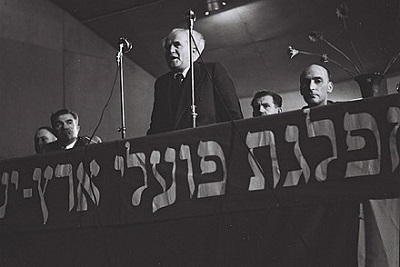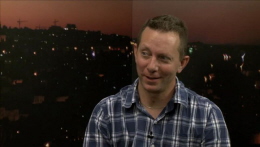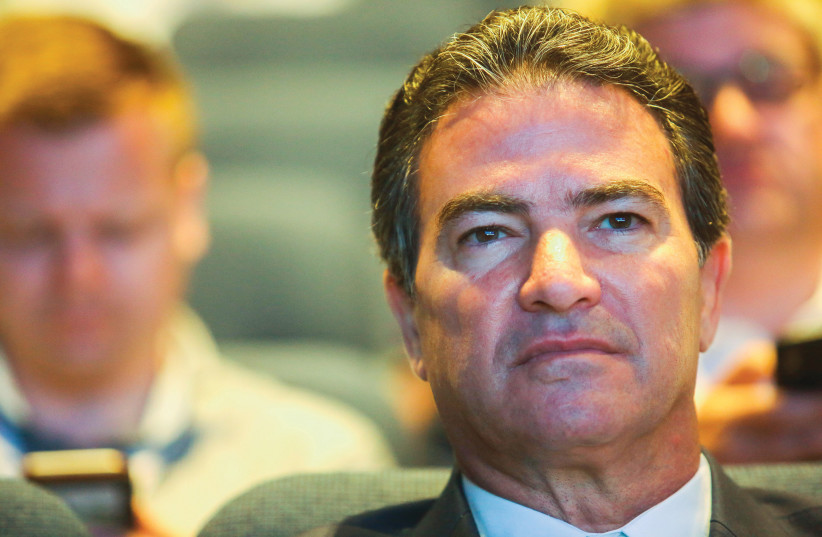 Dawid Ben Gurion przemawiający na zjeździe partii Mapai w 1949 (Źródło: Wikipedia)
Dawid Ben Gurion przemawiający na zjeździe partii Mapai w 1949 (Źródło: Wikipedia)
 Guardian: Izrael jest państwem ”żydowskich suprematystów”, które nie ma prawa istnieć
Guardian: Izrael jest państwem ”żydowskich suprematystów”, które nie ma prawa istnieć
Adam Levick
Tłumaczenie: Andrzej Koraszewski
Dwunastego stycznia “Guardian” opublikował artykuł Hagaia El-Ada, Izraelczyka stojącego na czele antyizraelskiej NGO B’tselem. Artykuł opatrzony tytułem: “Jesteśmy największą organizacją praw człowieka i nazywamy to apartheidem” redakcja osobno specjalnie poleca w dziale wiadomości pisząc: “Izrael; jest niedemokratyczną dyktaturą apartheidu – stwierdzają obrońcy praw”.
Być może jeszcze bardziej niepokojąca niż fałszywe oskarżenie o apartheid jest ewidentnie antysemicka narracja tego artykułu. (Antysemicka zgodnie z powszechnie używaną IHRA Working Definition, która stwierdza, że antysemityzmem jest również: “Odmawianie żydowskiemu narodowi prawa do samostanowienia, to znaczy, twierdzenie że samo istnienie państwa Izrael jest rasistowskie”.
To właśnie widzimy w całym artykule, a szczególnie w oskarżeniu o “żydowską supremację”:
“To, że izraelskie definicje nie odwołują się do koloru skóry nie ma znaczenia, rzeczywistość supremacji jest istotą sprawy i musi być przezwyciężona.
…
Mogą one grozić osądem moralnym, a w końcu, uchowaj Boże, realnymi konsekwencjami. Jednak, powolna, cicha stopniowa akumulacja dyskryminacji powstrzymuje reperkusje ze strony międzynarodowej społeczności, szczególnie dlatego, że [Izrael] werbalnie wychwala jej normy i oczekiwania.
Tak właśnie żydowska supremacja jest po obu stronach zielonej linii ustanawiana i stosowana.
…
W rzeczywistości jeden rząd rządzi wszystkim i wszystkimi między rzeką i morzem, narzucając same zasady organizacyjne wszędzie, gdzie ma swoją kontrolę, dążąc do wprowadzenia i utrwalenia supremacji jednego narodu – Żydów nad drugim – Palestyńczykami.
…
Przeszłość jest pasmem traum i niesprawiedliwości. Teraźniejszość przynosi jeszcze więcej niesprawiedliwości. Przyszłość musi być radykalnie inna – odrzucenie supremacji, oparte na oddaniu sprawiedliwości i wspólnym człowieczeństwie.”
Twierdzenie, że Izrael jest oparty na “żydowskiej supremacji” i że politycznym rozwiązaniem musi być odrzucenie tej supremacji, sugeruje że państwo, to znaczy syjonistyczne państwo żydowskie – jest z natury rasistowskie i musi być radykalnie zmienione (z założeniem, że będzie niesyjonistyczne).
Samo określenie „żydowska supremacja” wywodzi się niewątpliwie z antysemickiego słownika i Linda Sarsour była w ubiegłym roku powszechnie potępiana za powiedzenie, że państwo Izrael; zostało zbudowane na “żydowskiej supremacji”. Johnathan Greenblatt z ADL określił to jej oskarżenie jako czysty antysemityzm.
Twierdzenie Hagaia El-Ada, że Izrael jest (niedemokratycznym) państwem supremacji wspiera się na cytowanym wyżej fragmencie, że Izrael “rządzi wszystkim i wszystkimi między rzeką i morzem” oraz, że państwo “dąży do wprowadzenia i utrwalenia supremacji jednego narodu – Żydów, nad drugim – Palestyńczyków”.
Spróbujmy się temu przyjrzeć. Autor twierdzi, że Izrael rządzi nie tylko Palestyńczykami na obszarze A Autonomii Palestyńskiej, ale nawet rządzi dwoma milionami Gazańczyków, żyjących pod rządami Hamasu.
Pomijając fakt, że piętnaście lat temu Izraelczycy całkowicie się wycofali, Hagai El-Ad utrzymuje, że Gaza jest nadal okupowana, twierdząc, że restrykcje dostępu do enklawy od strony morza oraz to, że mieszkańcy Gazy nie mogą brać udziału w izraelskich wyborach nie jest spowodowane względami bezpieczeństwa związanymi z ludobójczym charakterem Hamasu, ale wynika z przekonania, że Żydzi są lepsi od Palestyńczyków i dlatego powinni nad nimi dominować.
Astronomiczny błąd tego autora i innych antysyjonistów publikujących na łamach „Guardiana” polega na tym, że syjonizm nie jest przekonaniem, iż Żydzi są lepsi od innych ludzi w tym regionie, ale że są tacy sami jak nie-Żydzi i w związku z tym mają naturalne prawo do bezpieczeństwa, obrony swojego życia i samostanowienia, z jakiego korzystają inne narody. W długim okresie przed powstaniem Izraela Żydzi byli skazani na niepewną pozycję gorszych poddanych, narażonych na kaprysy władców i odruchy motłochu. Byli obiektem dyskryminacji w stosunku do swoich nieżydowskich sąsiadów, która powodowała ustawiczne narażenie na antysemicką przemoc.
Syjonizm właściwie rozumiany był i jest postępowym, rewolucyjnym ruchem na rzecz równych praw Żydów.
Antysyjonizm, jak napisał izraelski dziennikarz Eylon Levy, powinien być postrzegany jako regresywny, kontrrewolucyjny ruch zmierzający do odebrania Żydom praw, które odzyskali i przywrócenia starego, groźnego porządku. Jest to ruch, który oczywiście nie odpowiada na pytanie, jak Żydzi bez posiadania niepodległości mogliby się bronić przed regionalnymi antysemickimi grupami terroru i przed państwami, które zmierzają do ich podbicia i wymordowania.
Aczkolwiek dziennikarze “Guardiana” czasami pisali uczciwie o niebezpieczeństwie antysemityzmu, decyzja redakcji o publikacji i szczególnym promowaniu artykułu Hagaia El-Ada i ich systematyczna tolerancja dla tego rodzaju antysyjonistycznej nienawiści, po raz kolejny pokazuje moralną przepaść między gołosłownymi i abstrakcyjnymi potępieniami antyżydowskiego rasizmu, a faktyczną walką z tą plagą w rzeczywistym świecie.
 Adam Levick
Adam Levick
Redaktor naczelny strony Camera UK śledczącej antysemityzm w brytyjskich mediach.
Zawartość publikowanych artykułów i materiałów nie reprezentuje poglądów ani opinii Reunion’68,
ani też webmastera Blogu Reunion’68, chyba ze jest to wyraźnie zaznaczone.
Twoje uwagi, linki, własne artykuły lub wiadomości prześlij na adres:
webmaster@reunion68.com



